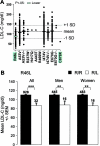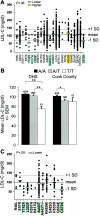A spectrum of PCSK9 alleles contributes to plasma levels of low-density lipoprotein cholesterol
- PMID: 16465619
- PMCID: PMC1380285
- DOI: 10.1086/500615
A spectrum of PCSK9 alleles contributes to plasma levels of low-density lipoprotein cholesterol
Abstract
Selected missense mutations in the proprotein convertase subtilisin/kexin type 9 serine protease gene (PCSK9) cause autosomal dominant hypercholesterolemia, whereas nonsense mutations in the same gene are associated with low plasma levels of low-density lipoprotein cholesterol (LDL-C). Here, DNA sequencing and chip-based oligonucleotide hybridization were used to determine whether other sequence variations in PCSK9 contribute to differences in LDL-C levels. The coding regions of PCSK9 were sequenced in the blacks and whites from the Dallas Heart Study (n=3,543) who had the lowest (<5th percentile) and highest (>95th percentile) plasma levels of LDL-C. Of the 17 missense variants identified, 3 (R46L, L253F, and A443T) were significantly and reproducibly associated with lower plasma levels of LDL-C (reductions ranging from 3.5% to 30%). None of the low-LDL-C variants were associated with increased hepatic triglyceride content, as measured by proton magnetic resonance spectroscopy. This finding is most consistent with the reduction in LDL-C being caused primarily by accelerating LDL clearance, rather than by reduced lipoprotein production. Association studies with 93 noncoding single-nucleotide polymorphisms (SNPs) at the PCSK9 locus identified 3 SNPs associated with modest differences in plasma LDL-C levels. Thus, a spectrum of sequence variations ranging in frequency (from 0.2% to 34%) and magnitude of effect (from a 3% increase to a 49% decrease) contribute to interindividual differences in LDL-C levels. These findings reveal that PCSK9 activity is a major determinant of plasma levels of LDL-C in humans and make it an attractive therapeutic target for LDL-C lowering.
Figures






Similar articles
-
Influence of PCSK9 polymorphisms on plasma lipids and response to atorvastatin treatment in Brazilian subjects.J Clin Lipidol. 2014 May-Jun;8(3):256-64. doi: 10.1016/j.jacl.2014.02.008. Epub 2014 Mar 5. J Clin Lipidol. 2014. PMID: 24793346
-
Genetic variants in PCSK9 in the Japanese population: rare genetic variants in PCSK9 might collectively contribute to plasma LDL cholesterol levels in the general population.Atherosclerosis. 2008 Jan;196(1):29-36. doi: 10.1016/j.atherosclerosis.2006.12.035. Epub 2007 Feb 21. Atherosclerosis. 2008. PMID: 17316651
-
Both rare and common variants in PCSK9 influence plasma low-density lipoprotein cholesterol level in American Indians.J Clin Endocrinol Metab. 2015 Feb;100(2):E345-9. doi: 10.1210/jc.2014-3340. Epub 2014 Nov 20. J Clin Endocrinol Metab. 2015. PMID: 25412415 Free PMC article.
-
PCSK9 gene mutations and low-density lipoprotein cholesterol.Clin Chim Acta. 2014 Apr 20;431:148-53. doi: 10.1016/j.cca.2014.01.043. Epub 2014 Feb 8. Clin Chim Acta. 2014. PMID: 24518357 Review.
-
Proprotein convertase subtilisin/kexin type 9 (PCSK9): from structure-function relation to therapeutic inhibition.Nutr Metab Cardiovasc Dis. 2011 Nov;21(11):835-43. doi: 10.1016/j.numecd.2011.06.002. Epub 2011 Sep 23. Nutr Metab Cardiovasc Dis. 2011. PMID: 21943799 Review.
Cited by
-
PCSK9 LNA antisense oligonucleotides induce sustained reduction of LDL cholesterol in nonhuman primates.Mol Ther. 2012 Feb;20(2):376-81. doi: 10.1038/mt.2011.260. Epub 2011 Nov 22. Mol Ther. 2012. PMID: 22108858 Free PMC article.
-
Contrasting genetic architectures in different mouse reference populations used for studying complex traits.Genome Res. 2015 Jun;25(6):775-91. doi: 10.1101/gr.187450.114. Epub 2015 May 7. Genome Res. 2015. PMID: 25953951 Free PMC article. Review.
-
The biology and therapeutic targeting of the proprotein convertases.Nat Rev Drug Discov. 2012 May;11(5):367-83. doi: 10.1038/nrd3699. Nat Rev Drug Discov. 2012. PMID: 22679642 Review.
-
Candidate gene association resource (CARe): design, methods, and proof of concept.Circ Cardiovasc Genet. 2010 Jun;3(3):267-75. doi: 10.1161/CIRCGENETICS.109.882696. Epub 2010 Apr 17. Circ Cardiovasc Genet. 2010. PMID: 20400780 Free PMC article.
-
Evidence for positive selection in the C-terminal domain of the cholesterol metabolism gene PCSK9 based on phylogenetic analysis in 14 primate species.PLoS One. 2007 Oct 31;2(10):e1098. doi: 10.1371/journal.pone.0001098. PLoS One. 2007. PMID: 17971861 Free PMC article.
References
Web Resources
-
- Online Mendelian Inheritance in Man (OMIM), http://www.ncbi.nlm.nih.gov/Omim/ (for LDLR, autosomal dominant hypercholesterolemia, and autosomal recessive hypercholesterolemia)
-
- Sorting Intolerant From Tolerant (SIFT), http://blocks.fhcrc.org/sift/SIFT.html
-
- The R Project for Statistical Computing, http://www.r-project.org/
References
-
- Benjannet S, Rhainds D, Essalmani R, Mayne J, Wickham L, Jin W, Asselin MC, Hamelin J, Varret M, Allard D, Trillard M, Abifadel M, Tebon A, Attie AD, Rader DJ, Boileau C, Brissette L, Chretien M, Prat A, Seidah NG (2004) NARC-1/PCSK9 and its natural mutants: zymogen cleavage and effects on the LDLR and LDL-cholesterol. J Biol Chem 279:48865–4887510.1074/jbc.M409699200 - DOI - PubMed
Publication types
MeSH terms
Substances
Grants and funding
LinkOut - more resources
Full Text Sources
Other Literature Sources
Medical
Molecular Biology Databases
Miscellaneous

